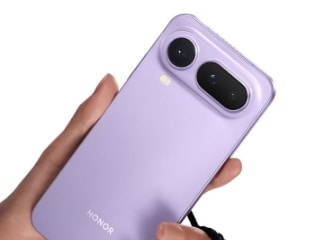- Home
- Smart home
- Smart home News
- Apple HomePod to Capture 4 Percent of 100 Million Smart Speaker Market in 2018: Canalys
Apple HomePod to Capture 4 Percent of 100 Million Smart Speaker Market in 2018: Canalys

HomePod, the smart speaker that Apple has so far launched in a handful of markets, will capture as much as four percent of the global smart speaker market this year, according to the latest report released by Canalys. The research firm also predicts that the overall smart speaker market will hit the mark of 100 million units by the end of 2018. Notably, a total of nine million smart speakers were shipped in the first quarter that included 3.2 million Google Home and Mini units and 2.5 million and Amazon Echo devices, as per a previous Canalys report.
The latest Canalys report highlights that while Amazon Echo range will continue to hold its domination with over 50 percent of the total installed base this year, Google's Home family will reach 30 percent share. These figures are indeed more impressive than the predicted four percent share of the HomePod. However, unlike the Echo and Home series of smart speakers that are widely available around the globe, Apple's offering is currently limited to a few regions only. The HomePod was particularly debuted in the US, UK, and Australia back in February and reached Canada, France, and Germany last month. Furthermore, the price could also be the key reason behind the slower growth prediction of the HomePod as it is priced at $449 (roughly Rs. 30,900).
Having said that, Canalys projects that Apple will capture 10 percent of the total market of smart speakers by 2022.
![]()
Photo Credit: Canalys
"The rapid growth of the smart speaker installed base is itself a growth driver," said Canalys Analyst Ben Stanton, in a press release while announcing the latest projection. "Amazon and Google are desperate to prove the scale and reach of their platforms to developers. As the Amazon Alexa and Google Assistant speaker installed bases grow, the companies can make a more compelling case. And as developers invest in voice and try to cash-in on the creation of new experiences, smart speaker adoption will grow. The battle for developers' attention is vital for Google and Amazon. It will determine the speed at which they can appeal to new demographics, move into new industry verticals and gain traction in new countries."
In terms of demographics, the US is so far leading the market, but other regions are also emerging on the list. Canalys claims that from a 73 percent share in 2017, the installed base of smart speakers in the US will shrink to 64 percent share in 2018. Similar will be the case of the UK, as predicted by the research firm, as its share will declined from 10 percent last year to 8 percent this year. Likewise, Germany is also claimed to see a fall from 8 percent to 6 percent. It is however reported that China will lead the race of the fastest adopters of smart speakers with 10 million smart speakers expected to be shipped to the Chinese market alone in 2018.
"China is still a nascent market for smart speakers, but it is a sleeping giant," said Canalys Research Analyst Hattie He, in the release. "In the second half of 2018, sales promotions will be an important driver, as vendors anticipate a surge of shipments during the 6.18 Shopping Festival and Singles Day in November. As competition intensifies, Chinese vendors will expand their product portfolios to hit more price points and offer a greater range of capabilities. But for long-term growth in China, a more complete voice service and better user engagement are just as important."
Catch the latest from the Consumer Electronics Show on Gadgets 360, at our CES 2026 hub.
Related Stories
- Samsung Galaxy Unpacked 2025
- ChatGPT
- Redmi Note 14 Pro+
- iPhone 16
- Apple Vision Pro
- Oneplus 12
- OnePlus Nord CE 3 Lite 5G
- iPhone 13
- Xiaomi 14 Pro
- Oppo Find N3
- Tecno Spark Go (2023)
- Realme V30
- Best Phones Under 25000
- Samsung Galaxy S24 Series
- Cryptocurrency
- iQoo 12
- Samsung Galaxy S24 Ultra
- Giottus
- Samsung Galaxy Z Flip 5
- Apple 'Scary Fast'
- Housefull 5
- GoPro Hero 12 Black Review
- Invincible Season 2
- JioGlass
- HD Ready TV
- Laptop Under 50000
- Smartwatch Under 10000
- Latest Mobile Phones
- Compare Phones
- Tecno Spark Go 3
- iQOO Z11 Turbo
- OPPO A6c
- Samsung Galaxy A07 5G
- Vivo Y500i
- OnePlus Turbo 6V
- OnePlus Turbo 6
- Itel Zeno 20 Max
- Lenovo Yoga Slim 7x (2025)
- Lenovo Yoga Slim 7a
- Lenovo Idea Tab Plus
- Realme Pad 3
- Garmin Quatix 8 Pro
- NoiseFit Pro 6R
- Haier H5E Series
- Acerpure Nitro Z Series 100-inch QLED TV
- Asus ROG Ally
- Nintendo Switch Lite
- Haier 1.6 Ton 5 Star Inverter Split AC (HSU19G-MZAID5BN-INV)
- Haier 1.6 Ton 5 Star Inverter Split AC (HSU19G-MZAIM5BN-INV)

















